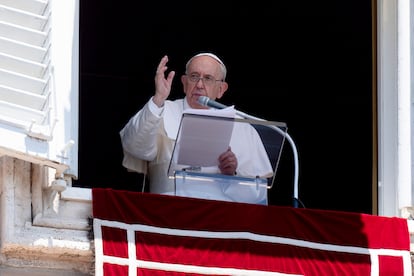Pope Francis says Ukraine war ‘perhaps provoked or not prevented’
In a conversation with Jesuit news editors, the pontiff added that ‘it would be simplistic and wrong’ to say that he is pro-Putin

Pope Francis has claimed that Russia’s invasion of Ukraine “perhaps, in some way, was provoked or not prevented,” according to the transcript of a conversation he had last month with the editors of European cultural magazines of the Society of Jesus, a religious order of the Catholic Church better known as the Jesuits.
In a transcript of that conversation published on Tuesday, the pontiff said that focusing solely on Russia could prevent people from appreciating “the whole drama unfolding behind this war, which was perhaps somehow either provoked or not prevented. And note the interest in testing and selling weapons.”
Pope Francis also mentioned a conversation with an unidentified head of state with whom he spoke before the start of the war, and who expressed concern about NATO “barking at the gates of Russia. And they don’t understand that the Russians are imperial and they don’t allow any foreign power to get close to them.” Francis said that this head of state “knew how to read the signs of what was happening.”
Before the invasion, Russian President Vladimir Putin had demanded that NATO rule out Ukrainian accession into the military alliance. And at first, the Russian leader sought to justify his attack by accusing NATO, which he defines as an instrument of US foreign policy, of provoking the war.
In the conversation, published by several media outlets including the newspaper La Stampa, the Pope stressed that he is not “pro-Putin” and that it would be “simplistic and wrong to say such a thing.” He further noted that Russia had “miscalculated” the war. “It is also true that the Russians thought that everything would be over in a week. They met a brave people, a people struggling to survive and with a history of struggle,” he added, praising the heroism of the Ukrainian people.
The pontiff also condemned the “ferocity and cruelty of the troops” used by the Russians, “who prefer to send Chechens, Syrians and mercenaries” and that “it is monstrous.” At the same time, he warned against what he claimed was a fairytale perception of conflict as good versus evil. “We have to move away from the usual Little Red Riding Hood scheme, where Little Red Riding Hood was the good guy and the wolf was the bad guy,” he said. He added: “There is something global emerging and the elements are very intertwined.”
On Tuesday morning, the pontiff published a message in which he affirmed that the invasion of Ukraine is a violation of the right to self-determination. “The war in Ukraine came to be added to the regional wars that in these years have been bringing death and destruction. But here the picture is more complex due to the direct intervention of a ‘superpower,’ which intends to impose its will against the principle of self-determination. Scenes of tragic memory are repeated and once again the reciprocal blackmail of the powerful silences the voice of humanity that invokes peace,” wrote the pontiff in his message for the World Day of the Poor of the Catholic Church, which will be observed in November.
¡Cuántos pobres genera la insensatez de la guerra! Dondequiera que se mire, se constata cómo la violencia afecta a los indefensos y a los más débiles. #DíaMundialdelosPobres https://t.co/l86snKDZkU
— Papa Francisco (@Pontifex_es) June 14, 2022
At the start of the war, Francis was criticized for being lukewarm and for not explicitly mentioning Russia or Vladimir Putin as being responsible for the attack. Later, the tone in his official messages and appearances hardened and he began to speak clearly of an invasion or the intervention of a “superpower,” as he did in the recent message for the World Day of the Poor. He even made himself available to travel to Kyiv, the capital of Ukraine.
In the interview, Francis explained that he intends to meet with Russian Orthodox Patriarch Kirill, a close Putin ally who supports the war in Ukraine, at an interfaith event in Kazakhstan. Kirill recently reproached Francis for asking him not to become the Kremlin’s “altar boy” in an interview with the Italian newspaper Il Corriere della Sera. The Russian Patriarch accused the Pope of having chosen the “wrong tone” to convey his message, adding that such comments could damage the traditionally sensitive dialogue between the two churches. Francis recalled that in a 40-minute conversation he had with the leader of the Russian Orthodox Church through a video call, the latter read him “a statement in which he gave the reasons to justify the war” and that he replied: “Brother, we are not clerics of the State, we are pastors of the people.” The two were scheduled to meet in Jerusalem in June, but the trip was mutually canceled due to the war.
The Argentine-born pontiff has also warned of the danger that attention to what is happening in Ukraine will decline over time. “What will happen when the enthusiasm to help wanes? Things are already getting cold, and who is going to take care of these women? We have to look beyond the concrete action of the moment, and see how we are going to support them so that they do not fall into trafficking, so that they do not get exploited, because the vultures are already circling overhead,” he warned.
Pope Francis has expressed that, in his opinion, the third world war has already broken out. “A few years ago it occurred to me to say that we were experiencing a third world war in pieces. Now, for me, it has been declared. And this is something that should make us reflect. What is happening to humanity that it has had three world wars in a century?
Tu suscripción se está usando en otro dispositivo
¿Quieres añadir otro usuario a tu suscripción?
Si continúas leyendo en este dispositivo, no se podrá leer en el otro.
FlechaTu suscripción se está usando en otro dispositivo y solo puedes acceder a EL PAÍS desde un dispositivo a la vez.
Si quieres compartir tu cuenta, cambia tu suscripción a la modalidad Premium, así podrás añadir otro usuario. Cada uno accederá con su propia cuenta de email, lo que os permitirá personalizar vuestra experiencia en EL PAÍS.
¿Tienes una suscripción de empresa? Accede aquí para contratar más cuentas.
En el caso de no saber quién está usando tu cuenta, te recomendamos cambiar tu contraseña aquí.
Si decides continuar compartiendo tu cuenta, este mensaje se mostrará en tu dispositivo y en el de la otra persona que está usando tu cuenta de forma indefinida, afectando a tu experiencia de lectura. Puedes consultar aquí los términos y condiciones de la suscripción digital.









































